|
|
|
Sort Order |
|
|
|
Items / Page
|
|
|
|
|
|
|
| Srl | Item |
| 1 |
ID:
132355
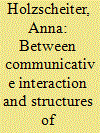

|
|
|
|
|
| Publication |
2014.
|
| Summary/Abstract |
This paper discusses contemporary engagement with the theory and analysis of discourse in international relations. It argues that discourse understood as "meaning in use" has emerged as one of the core concepts in constructivist scholarship, being of tremendous theoretical and analytical value. The paper identifies two distinct types of discourse analysis around which most contributions in this field converge: micro-interactional approaches that emphasize the communicative, pragmatic aspects of discourse and macro-structural approaches focusing on discourse as structures of signification. What unites these studies is their interest in the diffuse power relationships that characterize social interaction in international politics and the productive effects of power that the term "discourse" serves to underline. Through a combination of these two different strands of discourse research, with two different conceptualizations of power (deliberative and productive), the paper develops a taxonomy of discourse approaches that reflects four distinct variants of discourse research. These variants are illustrated by means of an in-depth discussion of recent innovative studies. In conclusion, the paper points to a number of limitations in the present conceptualization of power through discourse as well as in terms of the uneasy combination of positivist epistemology and constructivist ontology in much empirical discourse research. Discussing the overlap between discourse and practice scholarship, the paper sketches future directions for research in this field.
|
|
|
|
|
|
|
|
|
|
|
|
|
|
|
|
| 2 |
ID:
117762
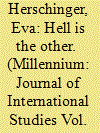

|
|
|
|
|
| Publication |
2012.
|
| Summary/Abstract |
The concept of hegemony has regained attention from various theoretical perspectives in International Relations. This article argues that IR-poststructuralism can offer an independent perspective on the production of hegemonies in international politics. Based on IR-poststructuralism and poststructuralist discourse theory, it develops a conceptual framework and an associated methodological approach for the analysis of international hegemonies in concrete discourses. Thereby, the article conceptualises international hegemonies as the creation of a specific type of collective identity while arguing that for hegemonies to emerge, both the creation of an antagonistic Other and a vision of the opposed Self are necessary. The workings of the conceptual framework are illustrated with a comparative reconstruction of United Nations discourses on international terrorism and drug prohibition from 1961 to 2011.
|
|
|
|
|
|
|
|
|
|
|
|
|
|
|
|
| 3 |
ID:
164037
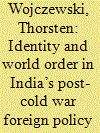

|
|
|
|
|
| Summary/Abstract |
This article examines the dominant conception of world order in India’s post-Cold War foreign policy discourse. Drawing on a poststructuralist, discourse-theoretical framework, I argue that the discourse uses foreign policy and world order as sites for the (re-)production of India’s identity by placing India into a system of differences that constitutes ‘what India is’. The article shows that India’s foreign policy discourse frames world order in accordance with India’s own national experiences and thus seeks to upheave India’s identity to a position from where it can represent the universal: a global political community. This notion of Indian Exceptionalism constitutes the affective dimension of the discourse that obscures the absence of an extra-discursive foundation on which national identities could be grounded by endowing the Self with an imaginary essence and seemingly unique qualities.
|
|
|
|
|
|
|
|
|
|
|
|
|
|
|
|
| 4 |
ID:
158082
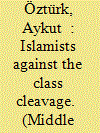

|
|
|
|
|
| Summary/Abstract |
One of the central characteristics of current Middle Eastern politics is the weakness of class-based political organizations. While structural explanations of this pattern abound, hegemonic struggles of Islamists to erode the class cleavage have so far been largely overlooked. In order to bring this perspective into the literature, this article studies discourses, affects and policies promoted by the Islamic trade unions confederation of Turkey, Hak-İş. After the introduction, I first demonstrate that the identity of Hak-İş has consistently been based on a fantasy of social cohesion and aversion to class-based politics. Building on this, I detail how Hak-İş has developed new economic and political practices, in a deliberate effort to overcome class-based unionism. Finally, I argue that the role of Hak-İş has evolved into representing workers' interests within the framework of the corporatist regime built by pro-Islamic AKP government.
|
|
|
|
|
|
|
|
|
|
|
|
|
|
|
|
| 5 |
ID:
108059
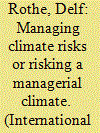

|
|
|
|
|
| Publication |
2011.
|
| Summary/Abstract |
Current international climate governance from a risk-political perspective points to a paradoxical moment in world risk society. While the probability of negative climate impacts increases and we can see the emergence of a common risk perception among international decision-makers, nation states in the international climate regime fail to agree on effective preventive measures that could mitigate the harming effects of global warming. While at the discursive level climate change is constructed as one of the major risks in the twenty-first century, the focus in international climate governance remains on voluntary measures and market-based instruments. Drawing on discourse theory, this paradox can be explained as the outcome of a discursive struggle in climate politics. Risk, in this perspective, is a political technology to govern the future that is embedded within broader political rationalities. Until 2007, risk management in climate governance was established as a form of advanced liberal government based on individualisation and self-responsibility. The growing consensus on dangerous climate change ultimately reinforces this advanced liberal risk management by presenting climate change as a 'naturalised' de-bounded risk and blurring its socio-economic causes.
|
|
|
|
|
|
|
|
|
|
|
|
|
|
|
|
| 6 |
ID:
189406
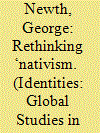

|
|
|
|
|
| Summary/Abstract |
Existing ideational approaches to nativism tend to conflate the concept with nationalism, xenophobia and populism, as well as overlooking the role of racism and racialisation in the process of constructing the non-native ‘out-group’, against the native ‘in-group’. Inspired by the Discourse Theoretical approach to populism, this article offers a significant conceptual contribution to studies on the far right by interpreting nativism as a racist and xenophobic discourse structured around an exclusionary vision of the nation. This conceptualisation helps identify how xenophobia, nationalism, racism and racialisation all contribute to nativist discourse, how nativism can be clearly demarcated from populism, and how nativist arguments can be articulated by parties beyond the far right.
|
|
|
|
|
|
|
|
|
|
|
|
|
|
|
|
|
|
|
|
|